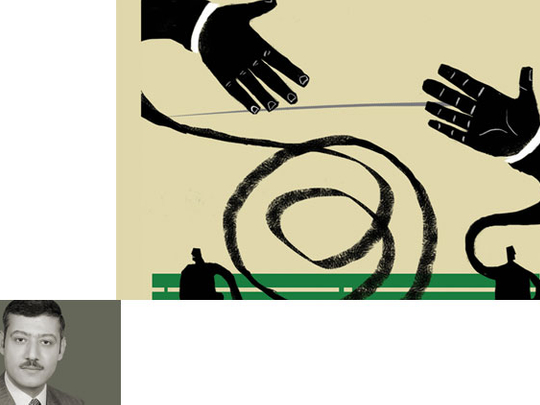
Since his election for the country’s top post last June, Egyptian President Mohammad Mursi has been sending mixed messages as to whether he seeks to normalise relations with Iran after more than three decades of bitter animosity. In the wake of the Egyptian revolution, pro-Iran analysts expected that the new Islamist government in Cairo would rush to forge closer ties with Tehran.
The assessment of the Iranian government was not much different. It welcomed the inauguration of Mursi as Egypt’s first Islamist leader. Iran’s President Mahmoud Ahmadinejad seized on the opportunity to congratulate Mursi and invited him to the Non-Aligned Movement (NAM) conference in Tehran in late August.
To the chagrin of Egypt’s western allies, Mursi accepted the invitation, making the first visit by any Egyptian president to Tehran since the fall of the Shah regime in 1979. Yet, Mursi did not impress his Iranian hosts when he took advantage of the NAM summit to call during a speech for the removal of the regime of President Bashar Al Assad, Iran closest regional ally.
To contain the mixture of shock and embarrassment felt by his hosts, Mursi then called for the establishment of a regional quartet that includes Iran alongside Egypt, Turkey and Saudi Arabia to solve the Syrian crisis. In a recent interview, Mursi made a goodwill gesture to the Iranians when he considered them part of the solution in Syria. Yet, he made normalisation of bilateral relations conditional upon Iran’s agreement to help remove the regime of Syrian President Bashar Al Assad.
Mursi’s remarks and general attitude towards Iran must have been perplexing for many. It should have been clear from the outset, however, that Cairo’s careful outreach to Tehran does not signal a shift in Egyptian foreign policy. On the contrary, Egypt under the rule of the Muslim brotherhood, to which Mursi belongs, has already decided to stick with its Arab and western partners over and above the Iranians.
Clash of interests
Indeed, the removal of Hosni Mubarak, a long-standing foe of Iran’s regional ambitions, may facilitate the establishment of normal relations between Tehran and Cairo; yet, given the fundamental clash of interests between the two countries that might not be as easy as many might expect. It is absolutely naive to assume that Egyptian Islamists will seek allies in Tehran merely because Islamic Shiite clerics are ruling in Iran. After all, Egypt’s Islamist movement is predominantly Sunni, as are its Arab allies in the Gulf, who share an interest in countering Iranian influence in the region.
Egypt, alongside its Arab Gulf allies, will seek to counteract Iran’s quest for regional hegemony. Cairo pursued this strategy under Mubarak and will continue to pursue it under any regime, be that of the Brotherhood or others.
Egypt is in fact trying to contain the sea change which engulfed the region after the fall of Saddam Hussain and the transfer of power from Sunni to Shiites in Iraq. The clash of interests is also tightly linked to the regional role both Iran and Egypt aspire to play as pivotal nations in the Middle East and the Gulf. Iran’s increasing interference in the internal affairs of Arab countries has also been and will remain a matter of great concern in Cairo. Iran is accused of trying to use Arab causes to advance its interests and enhance its position ahead of any future deal with the West over its nuclear programme.
Balancing act
Since the change of leadership in Egypt, Cairo has been trying mitigate the fears that its regional and foreign policy will change swiftly to embrace Iran. Mursi has repeatedly stated that his government will respect international treaties and maintain close ties with other Arab states, particularly Saudi Arabia, where Mursi made his first official state visit as president.
In addition, Egypt will seek to maintain close ties with the West and the US in particular. Good relations with the west and the Arab Gulf states are vital, at least in the short term, to help Egypt overcome its protracted economic plight.
For domestic reasons too the Egyptian government will have to be very careful in developing its ties with Iran. The Salafist party, Al Nour, another Islamist party in Egypt and seen by many as a key challenge for the Muslim Brotherhood as it seeks to increase its share of the Islamic popular base in the country, is leading a fierce campaign against the spread of Shiism in Egypt. Its members have gone so far as to warn against opening Egypt to Iranian tourism, for fears this would increase Shiite influence and challenge Egypt’s Sunni character.
For all these reasons, the removal of Mubarak and the arrival of Islamists to power in Egypt must be seen as a one little hurdle amongst many that need to be surmounted if Cairo and Tehran are to establish new relationship.
Dr Marwan Kabalan is the Dean of the Faculty of International Relations and Diplomacy at the University of Kalamoon, Damascus.










